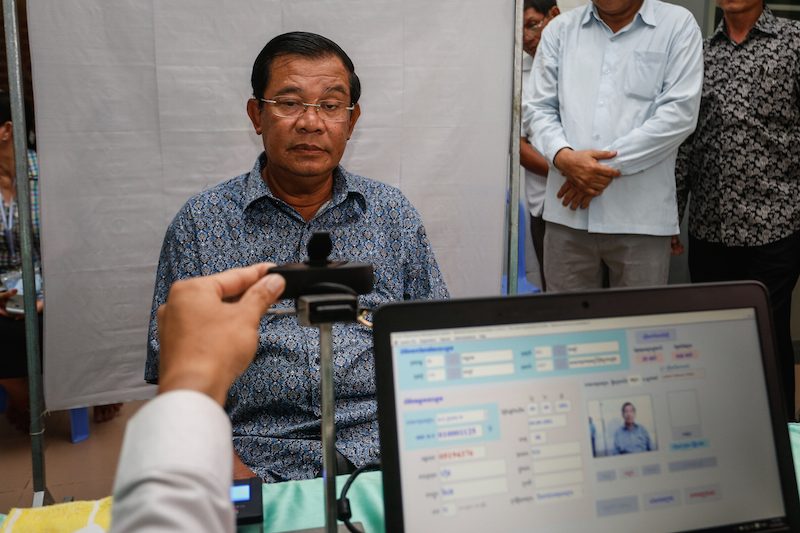Takhmao City, Kandal province – The three-month voter registration period opened on Thursday, with Prime Minister Hun Sen telling reporters after enrolling at his local commune office that he hopes the new voter registry will put an end to post-election protests.
After the July 2013 national election, the CNRP refused to take its National Assembly seats for almost a year, claiming that widespread “irregularities” skewed the vote in favor of the CPP, whose officials dominated the National Election Committee (NEC).

The opposition party only accepted defeat after Mr. Hun Sen’s ruling party pledged election reforms, including allowing the CNRP to have equal representation on a new NEC, which has been tasked with registering some 10 million eligible voters using a new digital system.
After a 20-minute process during which he and his wife, Bun Rany, had their fingerprints scanned, photographs taken, and personal details recorded, Mr. Hun Sen said that he hoped the new digital registry would end the routine claims of voter fraud after elections.
“It’s time to end that,” Mr. Hun Sen told reporters. “I hope they will not protest like that, but even losing at Facebook ‘likes’ they accuse me like that.”
The prime minister has been accused of buying his way to 5 million “likes” on Facebook by purchasing support from “click farms,” with millions of his fans living in countries like India and the Philippines known to have firms that offer the pay-for-play service.
Yet Mr. Hun Sen said that even if the CNRP did boycott its National Assembly seats in the future it would not matter, noting that new election laws the party agreed to would see their seats redistributed.
“Even if they make that accusation, I want to verify that if they do not join the National Assembly, and do not swear-in, all the seats will be lost,” Mr. Hun Sen said. “The new law does not let you boycott.”
The 2013 national election was marred by hundreds of thousands of double names and just as many missing names, with the old NEC having relied on paper registration forms and complicated periodic audits to check if people were properly registered.
The new digital voter registry is meant to prevent either issue from reoccurring, although it means everyone has to re-register over the next three months if they want to vote in the June 2017 commune council elections.
Opposition leader Sam Rainsy, who is in self-imposed exile in France to avoid a criminal defamation conviction, said by email that a clean voter registry still would not guarantee that coming elections were fair.
“We have to remain extremely and continuously vigilant because there are professional cheaters around,” said Mr. Rainsy, pointing to his own sidelining from campaigning as one such example.
“My being discarded from the election process as opposition leader, and this for purely political reasons, will jeopardize the legitimacy of the upcoming polls, which will be anything but an even playing field.”
The concern was shared by Koul Panha, the executive director of the Committee for Free and Fair Elections, who said that Mr. Rainsy and deputy opposition leader Kem Sokha have not been given the same freedom to campaign that Mr. Hun Sen has been exercising recently.
Mr. Sokha has been holed up inside the CNRP’s headquarters for three months to avoid arrest, and the military on Wednesday sent helicopters to circle above the building and armed troops to drive past in an apparent show of force.
“For the upcoming elections, I am worried about the playing field, and security. The voter list is important, but fair competition among the main political parties and the candidates is important too,” he added.
“If the opposition cannot freely engage in the election process, it affects the election.”